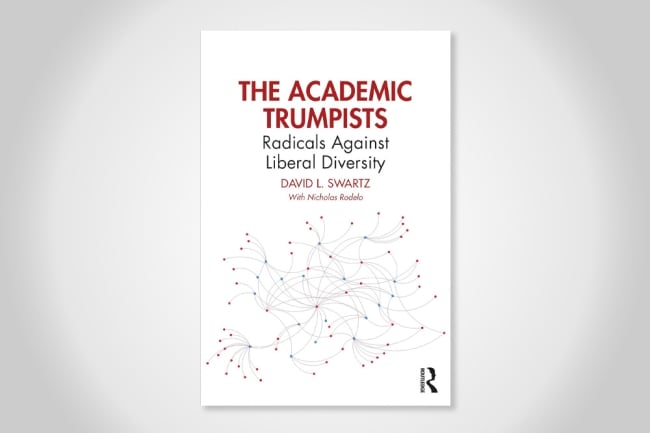You have /5 articles left.
Sign up for a free account or log in.

Routledge
Let’s just get it out of the way from the very start: No, the phrase “pro-Trump academic” is not an oxymoron. Furthermore, whatever image it may call to mind is almost certainly wrong—the product of stereotypes and partisan spin, in whichever direction, whether as isolated heroes or belligerent cranks.
The cohort is small but resilient and shows no more inclination to change course than the ex-president’s larger following. A provisional group portrait emerges from the pages of The Academic Trumpists: Radicals Against Liberal Diversity (Routledge) by David L. Swartz, a visiting researcher at Boston University, with assistance by his former student Nicholas Rodelo.
Swartz notes that his awareness of the phenomenon began in early 2017, from reading the Scholars and Writers for America endorsement of Trump issued the previous year. It had 177 signatories, out of which he identified 69 as teaching at colleges and universities and doing peer-reviewed scholarship. Internet searches turned up another 40 pro-Trump scholars meeting the same criteria who had not signed the Scholars and Writers statement.
He then gathered data on the 109 self-identified Trumpists: educational backgrounds, current academic appointments, publications and affiliations with think tanks and professional societies.
Another group of conservative academics had responded to developments in the GOP by rejecting Trump. There was no real difference between the arguments made for or against Trump by academics and the larger public in 2016. Nor have the arguments changed that much since then, and they need not be reprised.
Swartz found 89 conservative anti-Trumpist academics online, and their career data, too, was compiled for analysis. The aggregate pool came to 198 professors on the right, with the pro-Trump sample being the larger of the two.
The respective samples undoubtedly “undercount the actual number of relevant individuals,” Swartz admits, as “it may well be that other professors advocate their positions either for or against Trump in local media or other venues” he did not identify. Much of the data at hand could be quantified or otherwise made analyzable by computer—thus revealing a number of differences between pro- and anti-Trump public intellectuals in academia, some of which we’ll consider here.
But similarities appear as well, making the distinctions more significant.
All 198 individuals in the pool “identify as politically conservative, libertarian, and/or Republican.” Most have tenure. The demographic composition leans overwhelmingly male (more than 90 percent) and white (about 94 percent). A large majority of pro- and anti-Trump scholars received their highest degrees from one of the top 50 universities as listed by U.S. News & World Report. (The author does not endorse the USNWR rankings as anything but a widely used status metric.) And while conservatives have long railed against Harvard University as “a bastion of incorrigible liberalism,” in fact pro- and anti-Trump academics in his sample have degrees from it in comparable numbers (11 pro, 14 anti). Of the six Harvard faculty members in the sample, two are pro-Trumpists.
Certain media outlets have a vested interest in depicting conservatives as the American university’s one truly persecuted minority. Be that as it may, Swartz finds that the almost 200 academics on the right who opined on Trump in 2016 were full-fledged members of the community of scholars.
“Looking at only those disciplines represented by 10 or more of the 198 individuals,” he writes, “political science/government and law are the most represented, followed by history and economics.” And generalizing across the disciplines, Swartz finds that “the overwhelming majority have produced credible scholarship by the professional standards of their respective scholarly fields. They are also by and large not located in marginal institutions within the American academic field. Most are in mainstream research universities.”
Whether rallying to Trump or denouncing him, the conservative public intellectuals Swartz analyzes are, he writes, “carriers of prestigious academic capital (graduate credentials from high-ranking schools). Both groups are in fact cultural elites.”
Emphasizing this common ground is not the book’s aim, however. As an expositor and practitioner of Pierre Bourdieu’s approach to sociological inquiry, Swartz seeks to map the “field” structuring social interactions. The Bourdieusian concept of a field implies conflict and strategy. (Think of a playing field—or a battlefield.)
The nature of the conflict varies with the social sphere under analysis. As Swartz puts it, social actors in a political or intellectual field “employ different valued resources (cultural, social, and economic capitals) to maintain and enhance their views and positions.” Here “capital” refers to an accumulated degree of power, influence or legitimacy the possessor can draw on. It may be directly monetizable but often is not.
How one form of capital may be transformed into another and whether it can be exchanged between holders, or transmitted across generations, represents the defining preoccupation of Bourdieu’s cothinkers. The question cannot be answered in the abstract, but only by reconstructing how a given field operates.
Bourdieu’s work included an exhaustive (and exhausting) analysis of French intellectual life called Homo Academicus. The focus of The Academic Trumpists is microscopic by comparison. Working out even the broadest similarities between the pro- and anti-Trump cohorts of right-leaning academics involves only a very small slice of academic life. Zooming in on the differences within that aggregate sample reveals a set of distinctions in the kinds of capital (institutional, disciplinary and political, in particular) held by individual professors.
For example, about 63 percent of the conservative academics considered in the study received graduate degrees from one of the 50 most prestigious academic institutions in the country. Those going on to secure a teaching position within a top-50 institution can be said to have “reproduce[d] their location in the institutional prestige hierarchy from graduate school to the academic job market,” writes Swartz. Pro-Trump professors did so at a markedly lower rate than their fellow conservative colleagues who rejected him (28 percent and 38 percent, respectively).
Even starker is the contrast in the impacts of their scholarship on peers, at least in political science and as measured by h-index. (As with the USNWR rankings, Swartz seems wary of h-index calculations yet resigned to their use.)
The author finds that Trump’s conservative critics have an average h-index score “almost two times higher than for the Trumpists … Five anti-Trumpists have h-index scores of 24 or higher.” (What counts as a high h-index varies between disciplines, but an informal online discussion among political scientists suggests that a score of 20 would be expected for promotion to full professorship at a Research 1 university.) A few high h-index scores can be found “among the Trumpists but none of these approach the high scores of the five anti-Trumpists … At the opposite extreme, several Trumpists have extremely low h-index scores (2 and 3). Among the anti-Trumpists only two have very low scores.”
These inequalities might have any of a number of explanations and implications, and they map only part of the field that can be extracted from the data. More on that in next Friday’s column.




